Derek Gee and his Giro birds of wisdom
Plus an Only Fools and Cyclists rest day ride with the voices of cycling...
by Lionel Birnie
Photos by Daniel Friebe and Brian Nygaard
The finish line is in sight and over the next 36 hours we’ll find out if Geraint Thomas can hold off the challenge of Primoz Roglič and João Almeida and add the Giro d’Italia crown to his 2018 Tour de France title.
It’s been an excellent three weeks in the company of Daniel and Brian and we’ll wrap up the Giro journey in the next instalment of The 11.01 Cappuccino.
In the meantime, do subscribe as a Friend of the Podcast to listen to the full series of Kilometre 0 episodes. The depth and variety of stories is excellent, adding the subscriber feed is as easy as ordering a cappuccino in the afternoon, and the financial support is more important to us now than ever.
Friday
Stage winner: Einer Rubio
Maglia rosa: Geraint Thomas
The relentlessly bad weather had already forced the organisers to re-route the stage, cutting out the summit of the Col du Grand Saint-Bernard and taking the tunnel instead, shortening the distance by a few kilometres.
The forecast for the day was so grim the organisers agreed to move the start to the foot of the Croix de Coeur, leaving just under 75 kilometres to race. However, the freezing rain did not materialise and so the riders had the best of both worlds – less riding to do and dry roads.
You couldn’t begrudge the peloton a break after the almost relentless rainfall but it was a curious application of the extreme weather protocol. Brian put it succinctly. ‘Don’t take into consideration rain that’s already fallen.’
Undeniably, though, the riders seem to be speaking with one voice at the moment and a lot of that is down to the work being done by the recently-elected president of the CPA, Adam Hansen. The CPA – the Cyclistes Professionels Associés – is the union that represents all professional riders and since succeeding Gianni Bugno, Hansen has made it his priority to consult the riders on the issues that matter most to them. It’s not surprising that safety is pretty much top of the list of concerns in the peloton.
A few weeks before the Giro, I spoke to him for an episode that’s available to Friends of the Podcast. Hansen is never anything less than engaging. Over the years I’ve spoken to him outside his team bus at the Giro, Tour and Vuelta on subjects as diverse as veganism, software engineering, his love of European Christmas markets, and his handmade cycling shoes.
In a wide-ranging conversation we talked about how he sees his new role as CPA president and the challenges he faces ensuring the riders have a voice amid the more powerful interests of the race organisers, teams, sponsors and even the broadcasters.
The shortened course perhaps proved Mauro Vegni wrong because it was one of the more dynamic days of racing so far, despite being only about a third of the race director’s ideal distance for a mountain stage.
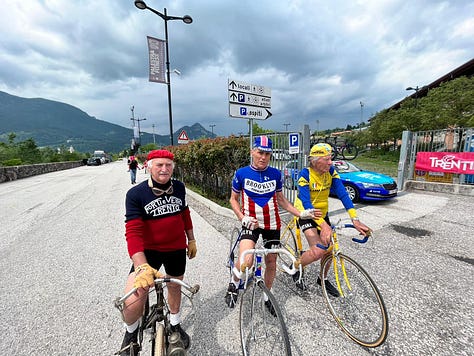
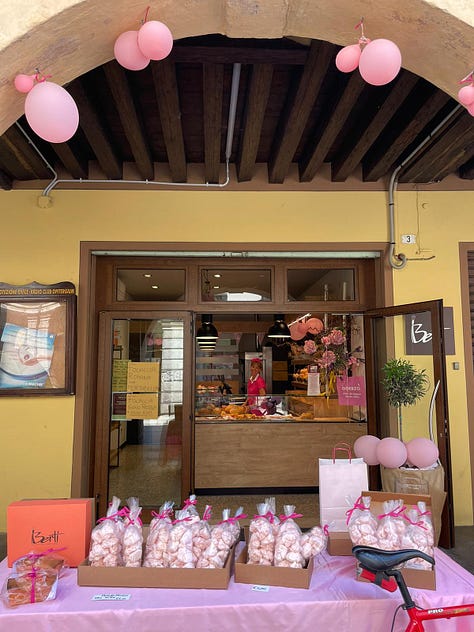
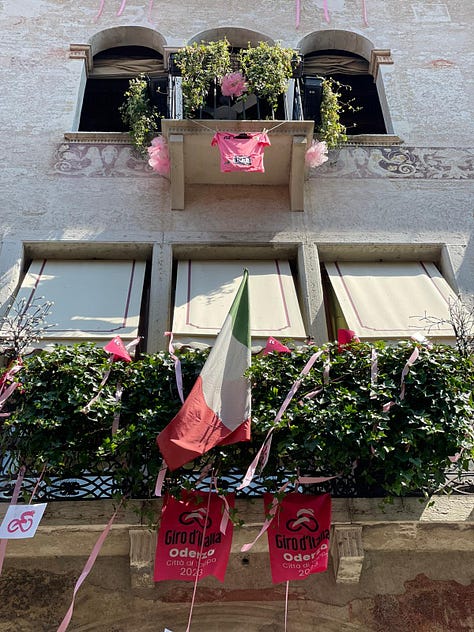
Saturday
Stage winner: Nico Denz
Maglia rosa: Bruno Armirail
Derek Gee has been one of the revelations of the race and this was the third time he’d finished second during his debut grand tour. He’s rapidly winning fans outside his home country Canada with his fearless racing style. He’s new to the World Tour and, having stepped up from the Israel Cycling Academy team at the age of 25, it does feel like he’s in a hurry to make his mark.
However, if it means I never have to hear Daniel singing ‘Derek Gee’ to the tune of the Beatles ‘Let It Be’ ever again I’d be happy for the Canadian to finish anonymously in the bunch for the rest of the race.
I’m not sure why, but I suffer acute attacks of self-consciousness and embarrassment whenever anyone bursts into impromptu song in my presence. It probably stems from some deeply buried childhood trauma.
Nevertheless, I’ve developed an affinity with Derek Gee, despite his theme song, because he’s a keen ornithologist. My Dad was a twitcher too and as a child I spent as much time in hides on nature reserves (pretending to be able to see the hen harrier or spoonbill that everyone else had spotted) as I did watching cycling. Unlike cycling, I didn’t inherit my Dad’s interest in birdwatching to quite the same extent.
The quest to assign an appropriate nickname to Derek Gee generated almost as many emails to The Cycling Podcast’s HQ in Not Watford as everything else put together this month. Whether that says more about the Giro, about the podcast or about Gee himself, I don’t know.
The most popular suggestion was ‘loonie’ or ‘loon’, which is not the insult it might sound at first but is a play on the fact the Canadian dollar coin is nicknamed the loonie because it is decorated with the common loon, a bird native to Canada.
‘Derek Gee, Derek Gee, Derek Gee, Derek Geeee, seeking birds of wisdom, Derek Gee.’
Meanwhile, in the race, Geraint Thomas and Ineos Grenadiers were relieved of the responsibility of defending the pink jersey as the break gained a lot of time and Bruno Armirail leapt up the overall standings into the lead – the first Frenchman since Laurent Jalabert in 1999 to lead the Giro.

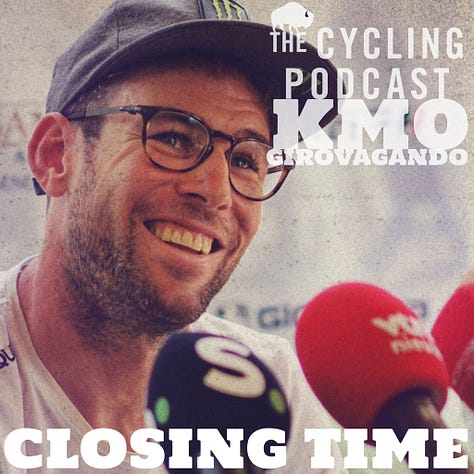

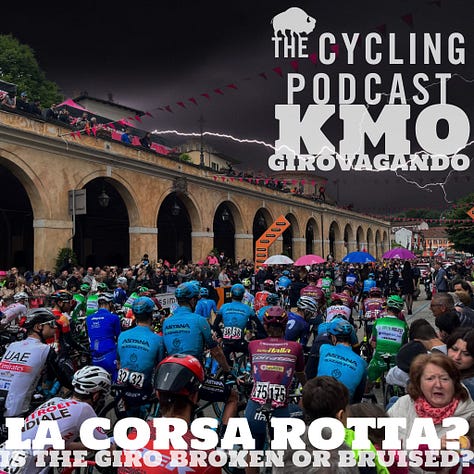

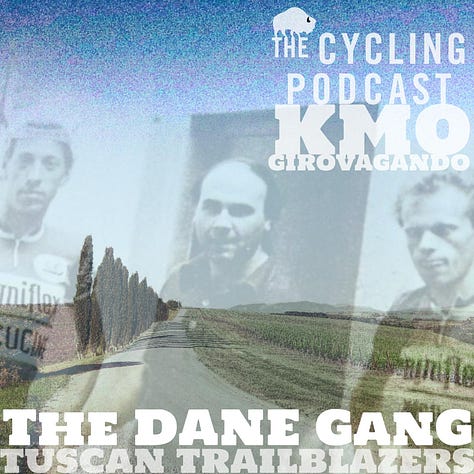
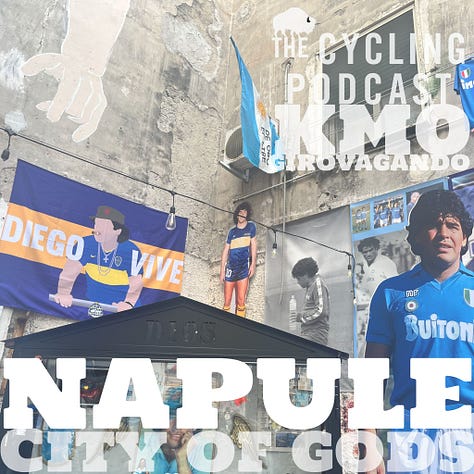
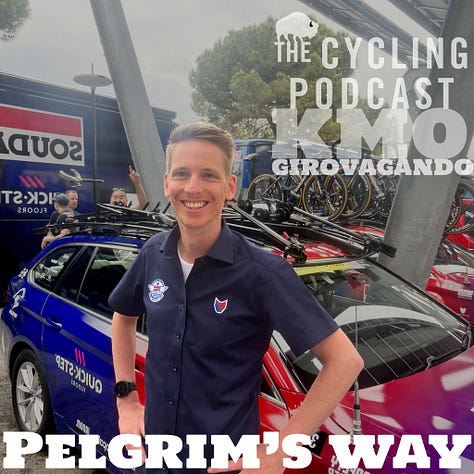
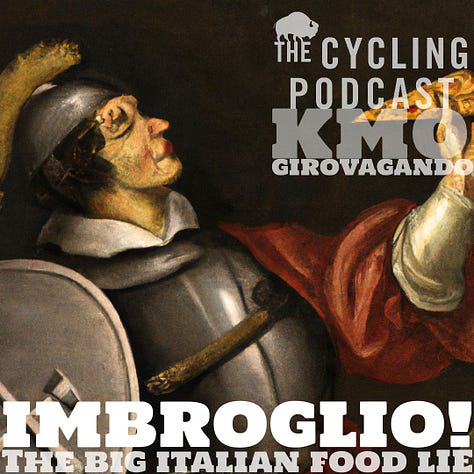
Sunday
Stage winner: Brandon McNulty
Maglia rosa: Bruno Armirail
The Giro headed to Bergamo, a city I’d like to explore a bit more, and perhaps will later this year when Il Lombardia, the race of the falling leaves, brings the curtain down on the European road racing season.
Six years ago, the race reached the city at the same stage, bringing to a close the second week. Bob Jungels won and the stage was notable because all of the GC contenders pulled away over the final two climbs and although there were no significant time gaps it was full gas racing for the last hour.
We had been lent a Maserati for that Giro and it was a wide, powerful, eye-catching car. Arguably too wide, powerful and eye-catching for either Daniel or I because neither of us are really petrolheads. It was undoubtedly a beautiful car, we just didn’t feel worthy of it.
As we got to Bergamo we followed a handwritten sign to the press parking which directed us towards an underground car park. There was a queue because it was full and there was also no way out except to reverse up the ramp back to the street. Daniel backed our way slowly up the curly ramp, tyres squeaking against the high kerb, and then we parked it next to a meter that needed feeding with three euro coins every hour. So I spent the afternoon dashing back and forwards to the car topping up the parking meter and each time I passed a furniture shop which for some reason had one of Moreno Argentin’s Bianchi time trial bikes from 1987 in the window. It had curved tubes, cowhorn-style handlebars and unforgiving-looking Campagnolo disc wheels. Like the Maserati, it was the sort of eye-catching embodiment of a certain type of Italian design. A possessed a showiness that is somehow both extravagant and yet beyond reproach.
Anyway, back to the present and Daniel and Brian were off in search of the soul of the Tifosi for an excellent episode of Kilometre 0. One of the quasi-mythical aspects of Italian cycling is that the fans are permanently split between their favourite protagonists. It all stems from the days of Coppi and Bartali and in the late 1970s and early 1980s Italy embraced a rivalry between Francesco Moser and Giuseppe Saronni – perhaps the only one to run the original close. How the country would love a rider of that stature now, let alone two of them.
The Giro does these semi-urban stages well, as we’ve seen in Napoli this year and last and in Turin last year. This was no exception, serving up another thrilling finish as Marco Frigo, initially dropped by Brandon McNulty and Ben Healy, fought back in the closing few hundred metres and almost sprung a surprise. McNulty denied Healy a second Giro stage win to claim his first victory in a grand tour.

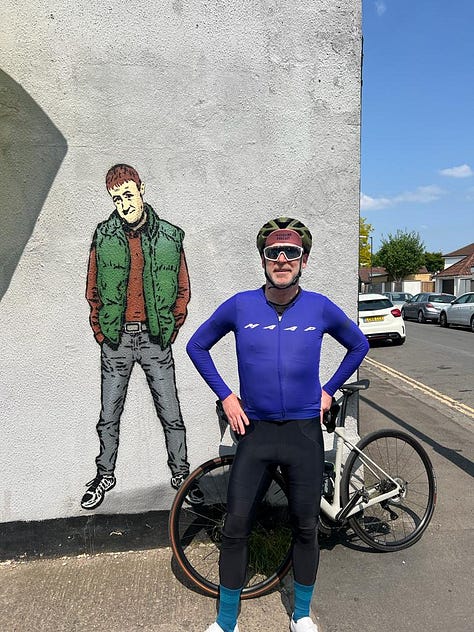
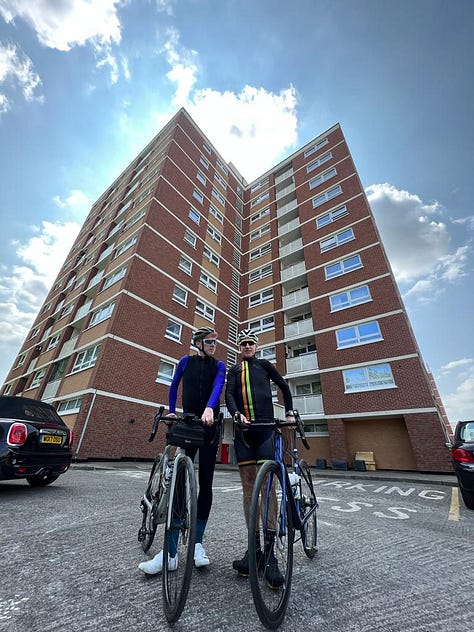
Monday
I headed off on a not-so-secret rest day mission to Bath in the south west of England to see two of the voices of cycling – the Eurosport-GCN commentary duo Rob Hatch and Sean Kelly.
After two weeks in the commentary box, they emerged blinking into the bright early summer sunshine for a brisk ride to Bristol and back. The idea was to record something for a forthcoming episode of Explore although I’m waiting to see what our producer can make of the random collection of recordings I managed to capture.
Because if truth be told the day turned into a bit of a social catch-up. Some listeners may know I wrote and published Sean’s autobiography, Hunger, ten years ago. I’d not seen him since well before lockdown, and although I saw Rob quite recently, in Gent when we were there for the Tour of Flanders, we’d not been for a bike ride together since the Trainer Road Challenge back in 2016.
Anyway, we took the Bristol to Bath railway path, part of the National Cycle Network, which took us to an industrial estate on the edge of the city. I asked Sean where he wanted to go next. ‘Demi-tour,’ – U-turn – he said.
I’m not quite sure why, but Rob and I started talking about Only Fools and Horses, the classic 1980s British sitcom featuring the Trotters, a family of market traders who live in a tower block in Peckham, south east London. I had a dim recollection that a Bristol tower block had been used for the exterior shots of ‘Nelson Mandela House’, where the fictional Trotters – Del, Rodney and Grandad (or later, Uncle Albert) – lived.
‘Are you a big fan of Only Fools and Horses?’ I asked Sean – not a question I ever imagined passing my lips when speaking to a former Paris-Roubaix, Liège-Bastogne-Liège and Vuelta a España champion
‘I wouldn’t say a big fan,’ he replied.
‘Shall we go and see the tower block?’ I asked, not really expecting anyone to be keen.
‘Yes, I’d like to go and see it,’ said Sean.
So we zig-zagged across the city, to Whitemead House, which is next door to Bristol City’s Ashton Gate football ground, to see this little piece of British pop culture heritage.
Over a post-ride beer, we talked about the Giro.
‘Can Geraint Thomas win it?’ Sean asked.
‘I was just about to ask you the same question.’
We discussed how the balance between the more explosive Primoz Roglič and the (relative) diesel Thomas might play out in the mountains. Thomas would surely struggle to drop the Slovenian and might then get Roglified at the finishes.
Then I speculated that Eddie Dunbar might have a very good outside shot of making the podium. ‘Armirail and Leknessund will probably fall away, so that puts him up from eighth to sixth already,’ I said.
‘He could certainly nudge ahead of Caruso and Kämna, so that puts him pretty much fourth’, I added, warming to the idea.
‘Don’t get carried away,’ said Sean. ‘He’ll need one of Thomas, Roglic or Almeida to have a real bad one to get on the podium.’
We agreed fourth would be an outstanding result for the Irishman and that my breezy prediction showed how easy grand tour racing is from the vantage point of a pub garden table in the warm late afternoon sunshine.
Tuesday
Stage winner: João Almedia
Maglia rosa: Geraint Thomas
At last, a race breaks out at the Giro d’Italia. Or, more to the point, the race for the maglia rosa burst into life.
João Almeida followed his UAE Team Emirates teammate McNulty in claiming the first grand tour stage victory of his career, pulling clear with Thomas and distancing Roglic. Dunbar was with Roglic and moved up to fifth…
In the podcast, Brian revealed that as a youngster Almeida didn’t like to breathe through his mouth – the sort of esoteric fact that this Giro’s coverage has pulled out on an almost daily basis.
Daniel had been busy putting together an episode of Kilometre 0 that documented a huge moment in British cycling’s history. On Monday’s rest day, Mark Cavendish announced his plan to retire at the end of the season. It was the day after his 38th birthday and his decision marks the beginning of the end of an era. Cavendish is, without too much doubt, the greatest sprinter of all time, one of the finest cyclists ever and the man who propelled Great Britain onto the world cycling stage (although it’s also important to acknowledge he’s a proud Manxman here).
As Daniel said, although the two are very different riders, it’s hard to imagine Bradley Wiggins winning the Tour de France in 2012 without Cavendish doing what he did first. By winning four stages of the 2008 Tour de France, then six the following year, then five, then another five and so on, Cavendish made people sit up and take notice and he paved the way for generations of other British riders.
Of course, his first grand tour stage win was at the Giro, in Catanzaro in 2008, and so there was something quite appropriate about him choosing to make his decision public in Italy, a country whose roads he learned on as a member of the British Cycling academy, and where he chose to live for a number of years.
As I listened to Closing Time, which was a poignant and at times quite personal reflection on the significance of this decision, my mind flashed back to 2007, when Cavendish burst onto the scene by winning Scheldeprijs. It felt like half a lifetime ago and yet as fresh as yesterday.
Daniel has had a deeper relationship with Cavendish than most in the press room. He’s written Cavendish’s books with him, documenting every significant up and down of an extraordinary career and the personal element of the episode made it all the better.
A couple of years ago, when Cavendish equalled Eddy Merckx’s record of Tour de France stage wins in Carcassonne, Richard suggested I write and record my own memories of the various interactions I’d had with Cavendish over the years for an episode of Kilometre 0. Daniel’s latest piece brings the Cavendish story right up to date, although perhaps there are still some chapters to be written. As you read this, there is one opportunity – in Rome on Sunday – for Cavendish to keep up his record of having won a stage of every edition of the Giro d’Italia he’s started. Tune in to the podcast and next edition of The 11.01 Cappuccino to see if he can do it.





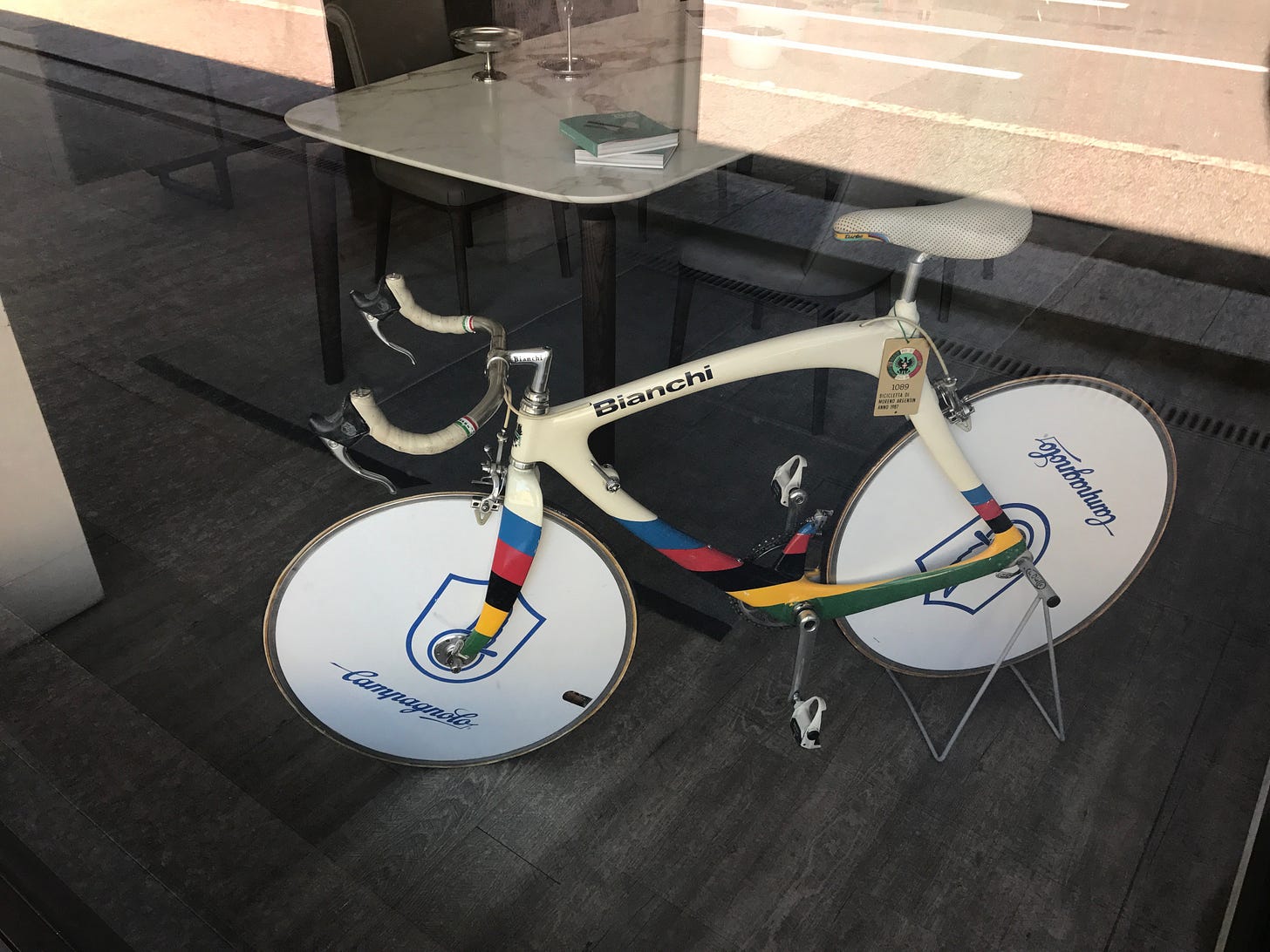
this is great - including only Seans and Horses...
Excellent writing as always Lionel. Looking forward to hearing you, Rob, and Sean riding and rambling on about whatever...